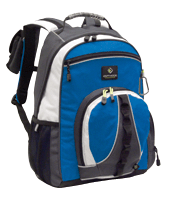Citable No. 52: TTAB Finds "OUTDOOR PRODUCTS" Generic for ... Guess What?
Despite Applicant Outdoor Recreation Group's ownership of two Section 2(f) registrations for the mark OUTDOOR PRODUCTS in logo form (shown immediately below), the Board affirmed a refusal to register the term OUTDOOR PRODUCTS for backpacks and clothing ["PRODUCTS" disclaimed in all three] because it found the term to be generic for the goods, or in the alternative, merely descriptive. In re The Outdoor Recreation Group, 81 USPQ2d 1392 (TTAB 2006).

Applicant argued that the PTO's refusal amounted to an "impermissible attack" on its incontestable registration for the mark shown on the left for overlapping goods. [As to the mark on the right, the registration covers the identical goods as the subject application.] Applicant further asserted that the PTO's refusal is inconsistent with the Office's treatment of the two prior marks. And in any case, according to Applicant, the PTO's evidence was insufficient to establish genericness. As to the 2(e)(1) refusal, Applicant claimed that its use of the mark for more than 30 years provides "clear evidence of acquired distinctiveness."

The Board ruled, not surprisingly, that OUTDOOR PRODUCTS is "somewhat more analogous to the phrase considered by the court in American Fertility than the compound word considered in Gould. Therefore, dictionary definitions alone cannot support a genericness refusal. In any case, the articles and advertisements submitted by Examining Attorney Martha L. Fromm established that "outdoor products" is the name of a class of goods.
Moreover, the Board ruled, the PTO's refusal does not constitute a collateral attack on Applicant's prior incontestable registration. First, genericness is alway an available ground for cancellation of an incontestable registration. Second, the mark and the goods of the registration differ from that of the subject application. Ownership of an incontestable registration "does not give the applicant a right to register the same or similar mark for different goods or services, even if they are closely related to the goods or services set forth in the incontestable registration."
Likewise, as to the argument regarding inconsistent treatment, the Board noted once again that "each application for registration of a mark for particular goods or services must be separately evaluated." As to the first registration, the marks and good differ. As to the second, although the goods are the same, the marks differ.
The Board concluded that the Applicant had failed to rebut the PTO's "strong showing" of genericness.
For the sake of completeness, the Board also considered the alternative mere descriptiveness refusal under Section 2(e)(1) and the PTO's rejection of Applicant's Section 2(f) evidence. Although Applicant used the subject phrase since 1974, it failed to submit any additional evidence of acquired distinctiveness. The record was devoid of "direct evidence that the relevant purchasers of applicant's goods view OUTDOOR PRODUCTS as a distinctive source indicator therefor." Give the "highly descriptive nature" of OUTDOOR PRODUCTS, the Board "would need to see a great deal more evidence (especially in the form of direct evidence from customers)."
The Board therefore affirmed the Section 2(e)(1) refusal.
TTABlog note: For a discussion of the Board's two-headed genericness test, which treats compound words and phrases differently, see the TTABlog posting here.
Text Copyright John L. Welch 2006.




0 Comments:
Post a Comment
<< Home